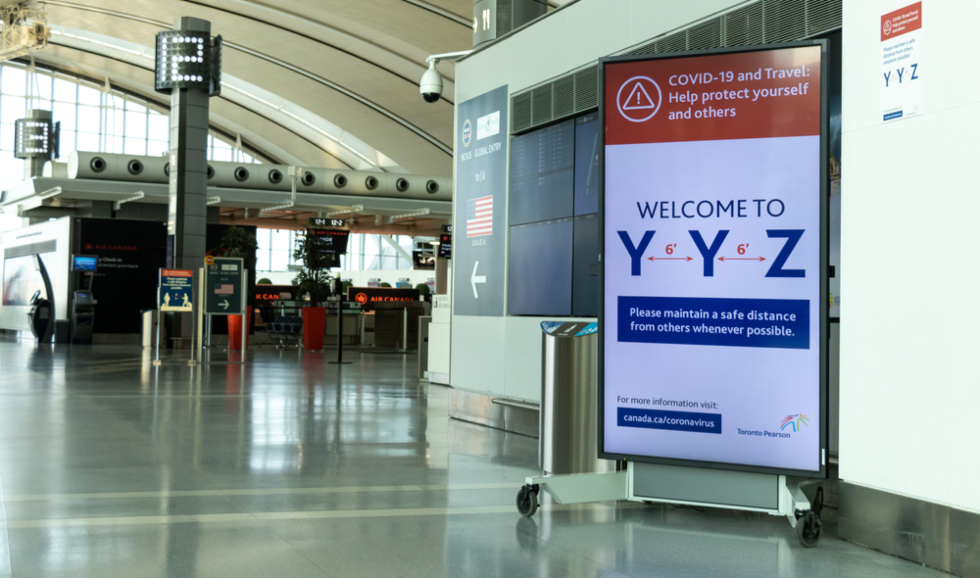McMaster HealthLabs, Air Canada and Greater Toronto Airports Authority to conduct a voluntary COVID-19 study of arriving international travellers

Photo by JL IMAGES / Shutterstock.com
September 3, 2020
McMaster HealthLabs, Air Canada and the Greater Toronto Airports Authority today announced that they will partner on a voluntary COVID-19 study of international travellers arriving at Toronto Pearson International Airport.
The study’s core purpose is to gather information to explore the effectiveness of various quarantine periods for travellers. McMaster HealthLabs is a non-profit organization that develops COVID-19 research initiatives and testing solutions to accelerate business recovery during the pandemic.
“MHL’s team of scientists and doctors from McMaster University, the Research Institute of St. Joseph’s Hamilton, and other Canadian universities and research organizations, generates scientific COVID-19 data to keep Canadians safe and to support a strong economy,” said John Gilmour, MHL’s chief executive officer. “Our study will provide data to help determine if an airport-based COVID-19 surveillance program is feasible, whether self-collection of COVID-19 testing is effective, and to explore options regarding the 14-day quarantine for international travel. The leadership of Air Canada and the GTAA in supporting COVID-19 research serves as a model for other organizations looking to make evidence-based decisions.”
“Air Canada has advocated for the adoption of rational, science-based measures in Canada relating to COVID-19, to allow for the prudent easing of travel restrictions and the mandatory 14- day quarantine, thereby striking a better balance for travellers and for the Canadian economy without adversely impacting public health. We are pleased to co-sponsor this extremely important study, which we believe should provide alternatives to the current blanket restrictions and quarantine,” said Dr. Jim Chung, chief medical officer at Air Canada.
“Air Canada believes that issues arising from COVID-19 related to travel can be safely managed using a science-based approach. The study performed by MHL, whose team has years of infectious disease academic research experience, should improve the understanding of the prevalence of COVID-19 among travellers so that safety measures implemented are proportionate to the actual risk.”
Air Canada has been at the forefront of the airline industry in responding to COVID-19, including being among the first carriers globally to require customer face coverings onboard and the first airline in the Americas to take customers’ temperatures prior to boarding. In May it introduced a comprehensive program, Air Canada CleanCare+, to apply industry leading biosafety measures at each stage of the journey.
“The Greater Toronto Airports Authority is committed to a science-based approach that prioritizes the health and wellbeing of passengers and airport workers. That starts with the collection and analysis of data, led by McMaster HealthLabs through their travel study,” said Deborah Flint, president and CEO, GTAA. “We are pleased to partner with Air Canada in this critically important work and welcome the opportunity to work collaboratively with the Government of Canada on this and other initiatives to support the safe resumption of international travel.”
The month-long research project has been designed and will be conducted by MHL in accordance with research ethics board-approved scientific protocols. The study will be the largest of its kind and will seek to examine the number and percentage of arriving international travellers who test positive for COVID-19 during the federal government’s quarantine period.
The findings of the study may be useful to the Government of Canada in its decision-making to control the spread of COVID-19 and in exploring policy options. Air Canada, as the largest Canadian airline operating out of Toronto’s Pearson International Airport, is providing resources and support for the study.
McMaster HealthLabs’ Scientific Director Dr. Marek Smieja, also a McMaster University professor and the study’s co-principal investigator, said, “MHL’s study will generate data to help us better understand and communicate the potential risk to the health of Canadians posed by international air travel and the risk of the importation of COVID-19.”
The COVID-19 molecular test being used in this study – already deployed in multiple clinical and research labs across the province – was designed by Dr. David Bulir, MHL’s Research Director and a co-investigator in the study.
“Having scientific data to support decision-making about COVID-19 is critical to keeping Canadians safe as we work to get the economy moving,” said Dr. Vivek Goel, co-principal investigator of the MHL study, professor at the University of Toronto and a former CEO of Public Health Ontario.
Under the study:
• Beginning Sept.3, international travellers arriving at Toronto-Pearson Terminal 1 will be invited to take part in the study on a strictly voluntary basis after providing informed consent.
• Consenting participants will provide a sample to MHL researchers before leaving the airport and supply two additional samples that will be self collected seven and 14 days after arrival, coinciding with the federal government’s quarantine period.
• MHL will have samples analyzed for COVID-19 at the Research Institute of St. Joe’s Hamilton using polymerase chain reaction (PCR) testing.
• Participants will be notified electronically of the first results within 48 hours. Data collected will remain confidential and will be anonymously aggregated for the purpose of the study.
• An independent data analysis will be conducted at the Dalla Lana School of Public Health at the University of Toronto under the supervision of the principal investigators who will have responsibility for publishing the results in peer reviewed journals and for supporting MHL in broadly sharing the study’s findings.
For more information please go to McMaster HealthLabs’ website.


